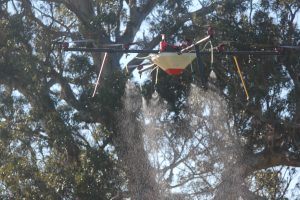“During the past four decades, the southern and northern slopes, as well as the mountain tops of the Outeniqua Mountains have fallen prey to the aggressive spread of invasive alien plants,in particular wattle and pine trees,” says Cobus Meiring of the Southern Cape Landowners Initiative (SCLI).
Mountain catchments, feeder streams, wetlands, fountains and underground water resources have dwindled significantly and alarmingly as a direct result of invasive alien trees claiming staggering volumes of water. Not only the farmers are feeling the effect of reduced water sources available to them to farm sustainably. Downstream water users in the Kammanassie and Olifants River systems, as well as the river systems supplying towns such as Oudtshoorn and Calitzdorp, have either run dry completely or are drastically under performing.
“Because of the costs related to the control and eradication of immensely dense stands of invasive alien plants and trees, farmers simply do not have the resources to eradicate and curb the spread of invasive alien plants,” says Meiring.
“However, the 2018 Outeniqua wildfire disaster, that destroyed close to 100 000 hectares of vegetation, provided landowners along the mountains a small window of opportunity to make inroads into the control of invasive alien plants on a large scale.”
According to a local Kammanassie farmer, Morné Jonker of the farm Ezeljacht, the best chance of success in addressing invasive alien plants on a large scale is to prevent regrowth after a fire such as what they experienced in 2018.
“The wildfire was intensely hot,destroyed the large stands of trees and stimulated new growth from the decades-old wattle seed bank, with literally in the hundreds of seedlings per square metre now growing out of the fertile ground.”
He says almost 500 hectares of mostly mountain and riverine land in their area are now experiencing regrowth of wattle and pine carpeting the landscape. Jonker estimates that more than 90% of the area is invaded by severe wattle regrowth.
Drone technology to curb invasive alien plants
“Our best chance of preventing these trees from reaching maturity is by the application of a suitable herbicide by means of an aerial spray, making use of drone technology,” says Jonker.
“Given the cost of labour and herbicide, the repeated application of herbicide required to suppress fast-growing invasive alien plants is extremely costly, compounded by unforgiving terrain and climatic conditions that are seldom conducive for herbicide application.”
Says Jonker, “The availability of specialised drone technology, adapted for carrying sufficient payload of herbicide to spray over dense stands of wattle along severely affected areas is our saving grace”.
“Not only is drone technology extremely affordable to us, given the scale of the problem and the difficulty of the terrain along steep mountain slopes and inaccessible riverine areas, but it is extremely effective and accurate in application.”
Southern Cape farmers, both on the dry and wet side of the Outeniqua Mountains are collaborating with SCLI in a collective effort to rehabilitate regional river systems in order to establish biodiversity conservation corridors.

Photo2: Drone in action
Farmers in the Klein Karoo are makinguse of drone technology in efforts to curb the spread of invasive alien plants.(Photo Credits: Cobus Meiring, SCLI)
** The Southern Cape Landowners Initiative (SCLI) is a public platformand think tank for landowners and land managers with an interest in invasivealien plant management, water stewardship and land management. SCLI issupported by the Table Mountain Fund (TMF), a subsidiary of WWF SA.
WEBSITE: http://www.scli.org.za
MEDIA ENQUIRIES
1. Morné Jonker, landowner and commercial farmer, Klein Karoo
Cell: 062 429 5614
Email: mornejonker@rocketmail.com
2. Cobus Meiring: Chair of the Southern Cape Landowners Initiative(SCLI)
Cell: 083 626 7619
Email: cobus@naturalbridge.co.za



